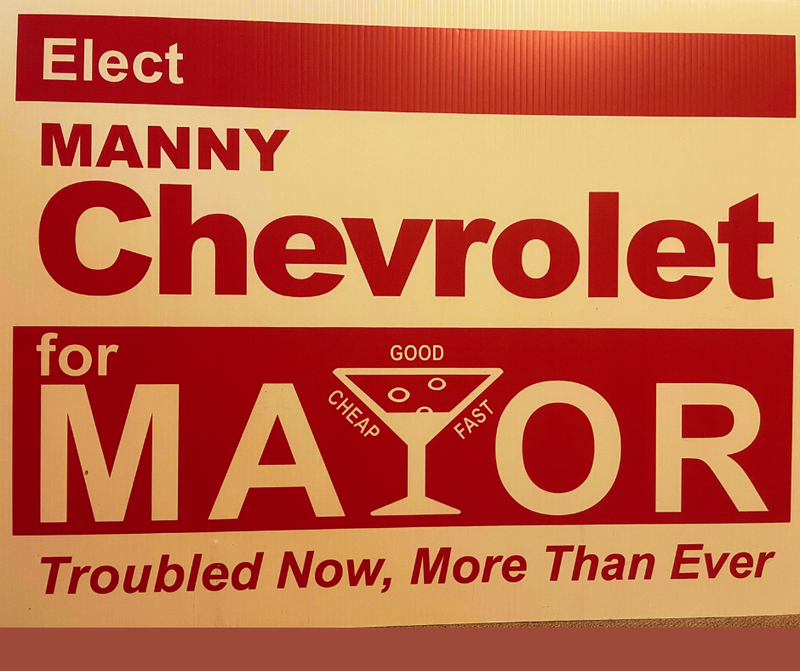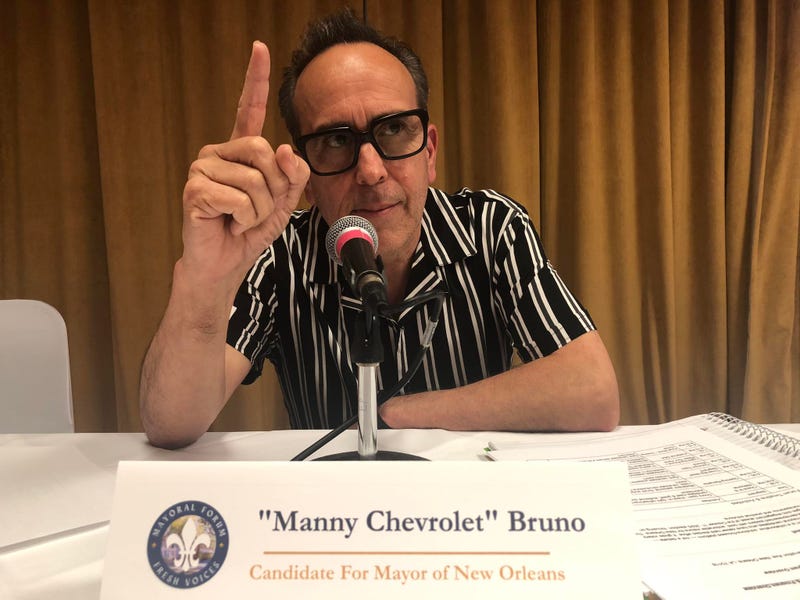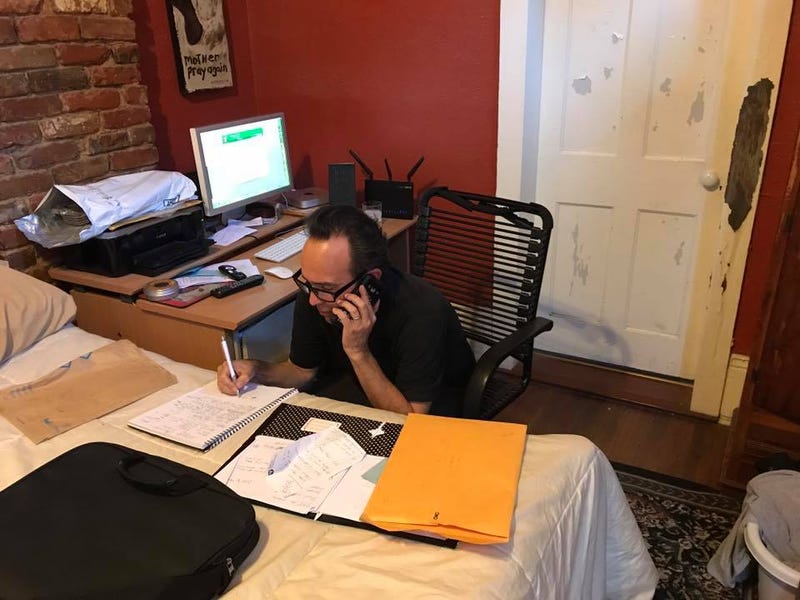
I’m troubled, I’m troubled, I’m troubled in mind. If trouble don’t kill me, I’ll live a long time...
(American folk song of unknown authorship)
…
“I came to New Orleans to get my act together.”
It's not a sentence you'd expect from a perennial politician. But such was the case for 7-time mayoral candidate, Manny Chevrolet.
“I was living in L.A. I was in the entertainment business, and I was going down the wrong roads,” Chevrolet tells me. “I had a brother of mine down here—an offshore guy. I came to stay with him thinking, ‘I'll be here for like a week or two or maybe a month.’ ... Well, that month turned into two months, three months. Then I met a girl who is now my wife.”
Shortly after concluding yet another unsuccessful bid for mayor of New Orleans, I found myself on the phone with Chevrolet as he finished a drive along Claiborne Avenue to retrieve campaign signs. He explained that the city fined candidates who failed to remove signage from the public right-of-way 48 hours after polls closed.
“Thankfully, I didn’t have much work to do. Most of my signs get stolen. And I don’t think in a bad way. People collect them as souvenirs,” he says.
The marketing tactics of a Manny Chevrolet campaign are undeniably unique. It’s not every day you see a candidate's lawn sign replace a "Y" with a martini glass.
Then there’s the pessimistic sloganeering, which sharply contrasts the perpetually hope-laden messaging voters are accustomed to getting hammered with during campaigns.
“Troubled Now, More than Ever…” one of his signs read.
“The Trouble Never Ends…” goes another.
And the original: “A Troubled Man for Troubled Times…”

…
Chevrolet showed up in New Orleans in the early 2000s. And while it didn’t take long for him to settle down in the Big Easy, he grew irritated with how people accepted such a dire status quo.
“It’s the Big Easy. But people were too laid back. I used to get angry and say: There are fixable problems here. Crime. Education. Homelessness. But people say, ‘Oh, let's just have a festival. Let’s just have a second line. Let's just have a parade.’ ... That kind of mentality pissed me off when I first moved down here. There were shops in the French Quarter saying, ‘We’re third world and proud of it.’”
“Well, you know, in several third-world countries, the kids know how to read and write,” he continues. “And back then, a lot of kids didn't know how to read here in New Orleans. So there's nothing funny about that— absolutely nothing funny about being third world.”
By 2002, he had decided he’d had enough. He chose to seek the city’s highest office.
On the first go, he only had enough money for one large campaign poster, which he hung on the Circle Bar balcony (New Orleans bar that’s no longer operational).
It said Vote Manny Chevrolet: Troubled Man for Troubled Times.

Ever since that banner hung, laments Chevrolet, those same troubles have persisted.
Manny "Chevrolet" Bruno finished 13th out of 15 candidates in his first election. But he discovered his blunt message resonated with at least a small sect of dissatisfied New Orleanians.
“Twenty-four years ago…that's what took off, that's what people really said, Yeah, yeah. I get it,” he explains.
His continued candidacies emerged as a sardonic critique against a corrosive, laissez-faire attitude, but eventually Chevrolet tuned his message into a demand for fundamental change in leadership.
As his foray into politics deepened, his opinions evolved into a sickness for the greed and self-interest that fumed over at City Hall. From Nagin, to Landrieu, to Cantrell, Chevrolet called for an eradication of favoritism and underhanded dealing that became synonymous with New Orleans mayors.
He also points out how there's something about a second term that truly reveals the character of a New Orleans mayor.
“Maybe if I won a second term I’d get crooked, too…I don’t know,” he ponders, but then states it’s a lack of friendship and financial ties that separates him from the rest.
“I've said this before over the years: There’ll be no patronage at my City Hall. Full transparency. I don't have people to pay off. I don't have any friends I need to pay off. In fact, I don't have any friends at all.”
“That's what I keep saying at all these forums over the past 20+ years,” he explains. “I keep pointing out we're talking about the same issues we talked about four years ago. If you want change, you gotta vote for change. If you vote for career politicians and wealthy businessmen, you're gonna get people who act like politicians and wealthy businessmen.”
But even when attempts at change occurred, Chevrolet points out how it's often performative and counterintuitive rather than meaningful and long-lasting efforts.
“We can’t do what Landrieu did. He’d boast about this pothole-filling truck going around the city 24/7, but his thing was turning potholes into speed bumps. We had some guy in the truck out there at 3 o'clock in the morning. He can't see what he's doing. But the administration would post, ‘We filled up another hundred pot holes…’ It’s like, yeah, but you just made another hundred speed bumps.”
The conversation turned to Cantrell, who has only a few months left in office.
While Chevrolet believes New Orleans' ills remained consistent regardless of administration, he does believe that, as a leader, Cantrell has failed to an even greater degree than her predecessors.
“The funny thing is that I should've seen this with LaToya during her first try for mayor in 2017,” Cheverloet recalls. “I was at a forum for the Alliance for Good Government. She's sitting to my right… Every time another candidate answered a question, LaToya would whisper in my ear: No, that's not true. It's not true. It's a lie. He doesn't know what he's talking about. No, no, no, no, no, that's not true.”
The odd behavior troubled him.
“There were about eight candidates at this forum, and I'm thinking to myself. Why is this woman doing this? Why is she saying that in my ear? Who am I? I'm just Manny Chevrolet, The Troubled Man for Troubled Times. There's something wrong here, and I should’ve seen that election that she might've turned into what she's become. She doesn't wanna listen to anybody, and she just thinks everybody's a liar.”
He spoke with a tone of sorrow while summing up the Cantrell administration.
“She’s going to go down as a pitiful, lying person who didn't do her job… You would think that your last 90 days in office, you'd try to tackle a couple of issues or get things that you promised done. I don't think she's done that at all. I think she's just too worried about going to jail right now.”

…
Outside of the unorthodox campaign signs, public forum attendance, and the occasional radio/TV interview, Manny Chevrolet has run his political ship without much traditional infrastructure or funding efforts. He has no website. No published platform. No TV buys. His main source of communication with supporters is via a Facebook page.
Following the election loss, he spoke to his followers:
“Well the people have spoken and yet again they have voted for more of the same
I want to thank everyone for all the support this past few months and for all the drinks.
206 voters got it right and I salute them.
Trouble [sic] now more than ever.”
This election, Chevrolet finished 7th out of 11 candidates.
…
A common question surrounding Chevrolet is whether he's attempting to be a serious candidate. The bullet-riddled signs, the cocktail glass "Y," the self-deprecation, is it just political satire meant to offer a politically exhausted city a bit of relief?
Cheverolet explains that while he agrees there’s clearly a comedic style to his campaigning, he’s just as serious as any other candidate vying for chief magistrate. He explains that the humor, while not the focus, is just a part of his comms strategy.
“It was more unserious, maybe, in the first election. Because during the first election, I was like in my late 30s and 40s, and I still had that show business mentality. But as I've gotten older and more elections have gone by, like I said before, the issues stay the same. I've told interviewers before: I'm very serious about this. I really want to help this city. This is the city I live in and the city I’m gonna die in. So I am serious. But at the same time, I wanna put humor to it, you know, because we have to.”
Looking to the future, Chevrolet’s doubtful if he’ll set his sights on the 2029 election.
“I'm a grassroots operation,” Cheverlet explains. “I don't have any money. But we'll see, I think this might be my last rodeo. I'm not 100% sure. We'll see in four years. Because, like you know, the trouble never ends.”
As for the incoming administration, Chevrolet holds out hope that Moreno could instigate positive change. Although he harbors the same skepticism, as he does with every administration.
“I still think there's just old money and an old old guard running this town. Greed is grafted in. So I don't think you're gonna see much improvement with your street, education problems, homeless problems."
Still, it's his hope that one day, the trouble will end. When asked if he had any message for the incoming Moreno administration, The Troubled Man for Troubled Times states:
“Just focus on your promises. I've seen 1 million of your commercials saying you want to make this city easier to live in. I just hope you focus on your promises. That's all I can say about that.”
